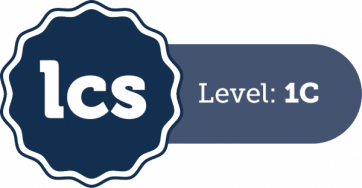Level 1c – Implementation & Improvement

Summary
A practitioner at Level 1c will have knowledge, understanding and application of Lean improvement and implementation techniques. Those at LCS 1c should be able to actively participate in improvement activities in the workplace.
Prerequisites for Level 1c

Level 1a, Level 1b.
Note that this refers to the knowledge of Level 1a and Level 1b, rather than specifically the qualifications. A course that encompasses several levels may not issue a Level 1a or Level 1b certificate, though it will cover Level 1a and Level 1b knowledge as part of the learning journey.
Accredited organisations can choose to have separate courses for Level 1a, Level 1b and Level 1c and certify at each level or have a programme that incorporates more than one level and only certify at the highest level covered, as suits their specific needs.

Level focus
On the implementation and improvement tools used to improve and sustain processes.
Level knowledge outcomes
- C1: Workplace organisation and optimisation techniques
- C2: Standard operations
- C3: Visual management and performance measures
- C4: Scheduling, and capacity planning
- C5: Enablers for flow
- C6: Management and planning
- C7: People, teams and sustainability

Level practice outcomes
LCS 1c practice focuses on the ability to:
- Apply workplace organisation techniques
- Implement standard work principles and tools
- Use visual management and performance measures for effective communication and control
- Implement capacity planning techniques and scheduling approaches
- Apply tools to enable flow
- Apply quality tools
- Apply techniques to understand the nature of demand and manage it effectively
- Use policy deployment techniques to plan, measure and communicate
- Use key people or ‘soft’ skills to effect change, lead, coach, participate and communicate.

Indicative Topics
A training programme that aims to cover the knowledge requirements for LCS Level 1c is likely to reference the topics listed below. The list is indicative; some topics may not be relevant, some will require passing reference only and there may be other relevant topics that are not included in the list.
Workplace organisation:
5S; cell design; layout; 3P – production, preparation, process; ergonomics
Standard operations:
SOPs; standards; leader-standard-work; TWI (job instruction, job methods)
Visual management and performance measures:
A3; display boards; Andon; team communications
Scheduling and capacity planning:
Theory of Constraints; pull systems; Kanban; Heijunka; drum buffer rope; CONWIP; runners-repeaters-strangers
Enablers for flow:
Takt time; TPM; SMED; OEE; demand management; mistake proofing/poke yoke; activity timing
Management and planning:
Policy deployment/Hoshin Kanri; project management; performance management; Scrum
People, teams and sustainability:
leadership; coaching; change management; facilitation; team management; personal communications; TWI (job relations)
The topics should be contextualised for the organisation for which the training is intended and those selected will depend on several factors – such as the nature of the organisation’s processes, whether it is manufacturing products or delivering intangible services – internally or externally, whether it is private or public sector, etc. This list is indicative; some topics may not be relevant, some will require passing reference only and there may be other topics that are taught that are not included here.

Delivery
A course or programme designed to deliver Level 1c outcomes can be organised in several ways and there is no prescribed format. It will typically use a combination of:
- Face to face, taught in groups – in modules or blocks of days
- Digital delivery and eLearning.
- Blended learning
- Workplace based guidance and support – going to the ‘Gemba’.
The total learning time guidance for a course aligned to Level 1c is 40 hours. This can include face to face teaching, elearning, assessment, pre/post course reading/research, practical application, offline group work, on the job training and one-to-one support activities.
Learning hours shown are meant to be indicative and a guide, rather than prescriptive; they are not a target and ideally a consequence of delivering effective training that addresses stated learning outcomes.
Note that a course could encompass two levels – for example, Level 1b and Level 1c. In these cases the learning hours are not additive, as synergies and economies of scale come into play.

Level Assessment
The assessment shall demonstrate that the outcomes have been achieved.
Knowledge
An assessment that demonstrates the learner can remember and understand L1c Implementation & Improvement, for example, through a multiple choice test, problem or case-based exams, oral exam, or essay exam.

Practical Application
The successful Level 1c practitioner shall provide evidence of the application of L1c related tools and techniques in the workplace. Methods that should be used to capture the evidence include A3 reports, project reports, workbook, project portfolio/log or diaries.
Talk to our qualified experts today about starting your LCS journey



